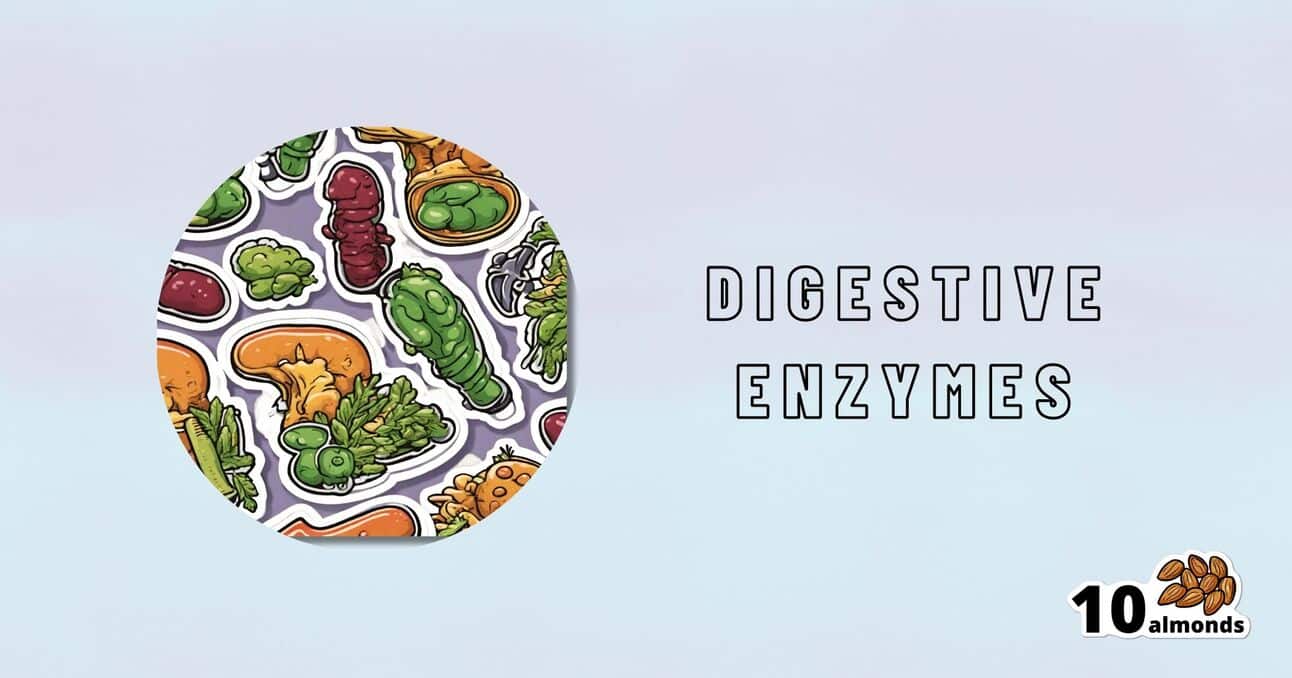Boost Your Digestive Enzymes
Plagued by stomach upset? Digestive enzymes like protease, amylase, and lipase could soothe your system. Find out the scientific verdict and where to get them.

We’ll Try To Make This Easy To Digest
Do you have a digestion-related problem?
If so, you’re far from alone; around 40% of Americans have digestive problems serious enough to disrupt everyday life:
New survey finds forty percent of Americans’ daily lives are disrupted by digestive troubles
…which puts Americans just a little over the global average of 35%:
Mostly likely on account of the Standard American Diet, or “SAD” as it often gets abbreviated in scientific literature.
There’s plenty we can do to improve gut health, for example:
- Making Friends With Your Gut (You Can Thank Us Later)
- Level-Up Your Fiber Intake! (Without Difficulty Or Discomfort)
- How Much Difference Do Probiotic Supplements Make?
Today we’re going to be examining digestive enzyme supplements!
What are digestive enzymes?
Digestive enzymes are enzymes that break down food into stuff we can use. Important amongst them are:
- Protease: breaks down proteins (into amino acids)
- Amylase: breaks down starches (into sugars)
- Lipase: breaks down fats (into fatty acids)
All three are available as popular supplements to aid digestion. How does the science stack up for them?
Protease
For this, we only found animal studies like this one, but the results have been promising:
Amylase
Again, the studies for this alone (not combined with other enzymes) have been solely from animal agriculture; here’s an example:
The Effect of Exogenous Amylase Supplementation on the Nutritional Value of Peas
Lipase
Unlike for protease and amylase, now we have human studies as well, and here’s what they had to say:
❝Lipase supplementation significantly reduced stomach fullness without change of EGG.
Furthermore, lipase supplementation may be helpful in control of FD symptom such as postprandial symptoms❞
~ Dr. Seon-Young Park & Dr. Jong-Sun Rew
Read more: Is Lipase Supplementation before a High Fat Meal Helpful to Patients with Functional Dyspepsia?
(short answer: yes, it is)
More studies found the same, such as:
Lipase Supplementation before a High-Fat Meal Reduces Perceptions of Fullness in Healthy Subjects
All together now!
When we look at studies for combination supplementation of digestive enzymes, more has been done, and/but it’s (as you might expect) less specific.
The following paper gives a good rundown:
Pancrelipase Therapy: A Combination Of Protease, Amylase, & Lipase
Is it safe?
For most people it is quite safe, but if taking high doses for a long time it can cause problems, and also there may be complications if you have diabetes, are otherwise immunocompromised, or have some other conditions (listed towards the end of the above-linked paper, along with further information that we can’t fit in here).
As ever, check with your doctor/pharmacist if you’re not completely sure!
Want some?
We don’t sell them, but for your convenience, here’s an example product on Amazon that contains all three 😎
Enjoy!
We’ll Try To Make This Easy To Digest
Do you have a digestion-related problem?
If so, you’re far from alone; around 40% of Americans have digestive problems serious enough to disrupt everyday life:
New survey finds forty percent of Americans’ daily lives are disrupted by digestive troubles
…which puts Americans just a little over the global average of 35%:
Mostly likely on account of the Standard American Diet, or “SAD” as it often gets abbreviated in scientific literature.
There’s plenty we can do to improve gut health, for example:
- Making Friends With Your Gut (You Can Thank Us Later)
- Level-Up Your Fiber Intake! (Without Difficulty Or Discomfort)
- How Much Difference Do Probiotic Supplements Make?
Today we’re going to be examining digestive enzyme supplements!
What are digestive enzymes?
Digestive enzymes are enzymes that break down food into stuff we can use. Important amongst them are:
- Protease: breaks down proteins (into amino acids)
- Amylase: breaks down starches (into sugars)
- Lipase: breaks down fats (into fatty acids)
All three are available as popular supplements to aid digestion. How does the science stack up for them?
Protease
For this, we only found animal studies like this one, but the results have been promising:
Amylase
Again, the studies for this alone (not combined with other enzymes) have been solely from animal agriculture; here’s an example:
The Effect of Exogenous Amylase Supplementation on the Nutritional Value of Peas
Lipase
Unlike for protease and amylase, now we have human studies as well, and here’s what they had to say:
❝Lipase supplementation significantly reduced stomach fullness without change of EGG.
Furthermore, lipase supplementation may be helpful in control of FD symptom such as postprandial symptoms❞
~ Dr. Seon-Young Park & Dr. Jong-Sun Rew
Read more: Is Lipase Supplementation before a High Fat Meal Helpful to Patients with Functional Dyspepsia?
(short answer: yes, it is)
More studies found the same, such as:
Lipase Supplementation before a High-Fat Meal Reduces Perceptions of Fullness in Healthy Subjects
All together now!
When we look at studies for combination supplementation of digestive enzymes, more has been done, and/but it’s (as you might expect) less specific.
The following paper gives a good rundown:
Pancrelipase Therapy: A Combination Of Protease, Amylase, & Lipase
Is it safe?
For most people it is quite safe, but if taking high doses for a long time it can cause problems, and also there may be complications if you have diabetes, are otherwise immunocompromised, or have some other conditions (listed towards the end of the above-linked paper, along with further information that we can’t fit in here).
As ever, check with your doctor/pharmacist if you’re not completely sure!
Want some?
We don’t sell them, but for your convenience, here’s an example product on Amazon that contains all three 😎
Enjoy!
Share This Post
Learn To Grow
Sign up for weekly gardening tips, product reviews and discounts.




